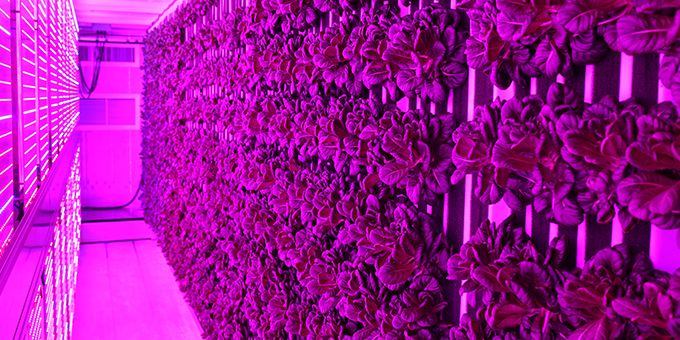With sustainability and transparency in mind, partnership will enable year-round on-campus food production at university and K-12 educational institutions and other national Sodexo clients.
 Freight Farms and Sodexo Announce Strategic National Partnership to Grow Food Onsite at School Campuses Across the U.S.
Freight Farms and Sodexo Announce Strategic National Partnership to Grow Food Onsite at School Campuses Across the U.S.

News From | Freight Farms
Freight Farms, the global innovation leader of containerized vertical farming, and Sodexo, the world leader of integrated food, facilities management and organizational quality of life services, have partnered to bring the most advanced hydroponic vertical farming technology to schools and universities across the country. The collaboration will usher in the implementation of Freight Farms' Greenery container farms to campuses across the U.S., enabling the onsite growth of fresh, traceable produce year-round that's pesticide and herbicide-free and sourced with zero food miles.
As awareness of key issues in food safety, health and wellness, and environmental sustainability continue to rise with increased urgency, this strategic partnership reflects Freight Farms' and Sodexo's shared vision to enable real, measurable change in food sourcing for educational and corporate institutions.
"Students, institutions, and corporate businesses want healthy, safe, and delicious food, and they want it sourced as sustainably as possible. Sodexo is proud to use and support the latest agricultural technology to create meaningful food system change, said Kenny Lipsman, Director of Produce Category for Sodexo. "Our partnership with Freight Farms allows us to grow nutritious, superior-quality food on-site for our clients, just steps from the kitchens and serveries. As part of Sodexo's Better Tomorrow Commitments, developed in accordance with the United Nations' Sustainable Development Goals, this technology allows for traceability, reductions in food waste, and year-round crop consistency."
Co-founder and CEO of Freight Farms Brad McNamara, continued, "Sodexo's commitment to offer onsite food production to its customers helps accelerate food system decentralization — leading the charge for better sourcing practices at an institutional level. Sodexo's adoption of Freight Farms on-site programming will demonstrate to their customers and client communities the positive impact hyper-local food production can have on priorities from nutrition and food safety to emissions reduction."
With the largest network of connected farms in the world, Freight Farms' customers are located in 25 countries and 44 U.S. states, and range from small business farmers to corporate, hospitality, retail, education, and nonprofit sectors. To date, 35 educational and corporate campuses use Freight Farms' technology, and together with Sodexo, implementation will rapidly expand across the U.S.
By integrating Freight Farms' 320 square foot Greenery onto campus, Sodexo's customers will reap numerous benefits, including:
Food miles and waste reduction
- Food is harvested steps from the plate, eliminating food miles
- Harvested onsite, food lasts significantly longer, reducing spoilage waste
- The Greenery uses 99.8% less water than traditional agriculture, and in some humid areas, operations can be water-positive
Peak freshness and nutrition, year-round
- Unlike food that has to travel great distances between harvest and plate, freshness and nutrient density does not degrade during transit
- Crops are never exposed to pesticides or herbicides
- The farms grow at commercial scale and maintain the perfect environmental conditions every day of the year
Safety, transparency, and data-driven traceability
- The hydroponic container farms are soil-free, a common carrier of E. coli, as well as decentralized from the mass supply chain
- Campus communities can get to know their own farmers and witness every growing stage of their food
- Proprietary IoT technology, farmhand, tracks produce from seed to plate, even down to the hour
Student and employee engagement
- Schools can choose to integrate their farms into interactive curricula across disciplines like science and technology, agriculture, nutrition, business, and social impact
- Corporate businesses can integrate their onsite farms into employee wellness and benefit programs
About Freight Farms
In 2012, Freight Farms debuted the first vertical hydroponic farm built inside an intermodal shipping container—the Leafy Green Machine—with the mission of democratizing and decentralizing the local production of fresh, healthy food. Now with the Greenery and integral IoT data platform, farmhand®, Freight Farms has the largest network of connected farms in the world, with global customers in 25 countries and 44 U.S. states ranging from small business farmers to corporate, hospitality, retail, education, and nonprofit sectors
About Sodexo North America
Sodexo North America is part of a global, Fortune 500 company with a presence in 72 countries. Sodexo is a leading provider of integrated food, facilities management and other services that enhance organizational performance, contribute to local communities and improve quality of life for millions of customers in corporate, education, healthcare, senior living, sports and leisure, government and other environments daily.
If you like this article you may like "LEDs Have a Growing Impact in Urban Farming"
The content & opinions in this article are the author’s and do not necessarily represent the views of AgriTechTomorrow
Comments (0)
This post does not have any comments. Be the first to leave a comment below.
Featured Product

